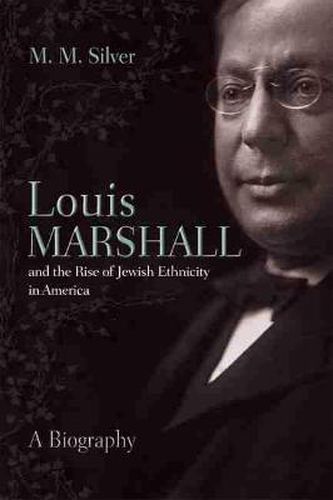Readings Newsletter
Become a Readings Member to make your shopping experience even easier.
Sign in or sign up for free!
You’re not far away from qualifying for FREE standard shipping within Australia
You’ve qualified for FREE standard shipping within Australia
The cart is loading…






A milestone in modern Jewish history and American ethnic history, the sweeping influence of Louis Marshall’s career through the 1920s is unprecedented. A tireless advocate for and leader of an array of notable American Jewish organisations and institutions, Marshall also spearheaded civil rights campaigns for other ethnic groups, blazing the trail for the NAACP, Native American groups, and environmental protection causes in the early twentieth century. No comprehensive biography has been published that does justice to Marshall’s richly diverse life as an impassioned defender of Jewish communal interests and as a prominent attorney who reportedly argued more cases before the Supreme Court than any other attorney of his era.
Silver eloquently fills that gap, tracing Marshall’s career in detail to reveal how Jewish subgroups of Eastern European immigrants and established Central European elites interacted in New York City and elsewhere to fuse distinctive communal perspectives on specific Jewish issues and broad American affairs. Through the chronicle of Marshall’s life, Silver sheds light on immigration policies, Jewish organisational and social history, environmental activism, and minority politics during World War I, and he bears witness to the rise of American Jewish ethnicity in pre-Holocaust America.
$9.00 standard shipping within Australia
FREE standard shipping within Australia for orders over $100.00
Express & International shipping calculated at checkout
Stock availability can be subject to change without notice. We recommend calling the shop or contacting our online team to check availability of low stock items. Please see our Shopping Online page for more details.
A milestone in modern Jewish history and American ethnic history, the sweeping influence of Louis Marshall’s career through the 1920s is unprecedented. A tireless advocate for and leader of an array of notable American Jewish organisations and institutions, Marshall also spearheaded civil rights campaigns for other ethnic groups, blazing the trail for the NAACP, Native American groups, and environmental protection causes in the early twentieth century. No comprehensive biography has been published that does justice to Marshall’s richly diverse life as an impassioned defender of Jewish communal interests and as a prominent attorney who reportedly argued more cases before the Supreme Court than any other attorney of his era.
Silver eloquently fills that gap, tracing Marshall’s career in detail to reveal how Jewish subgroups of Eastern European immigrants and established Central European elites interacted in New York City and elsewhere to fuse distinctive communal perspectives on specific Jewish issues and broad American affairs. Through the chronicle of Marshall’s life, Silver sheds light on immigration policies, Jewish organisational and social history, environmental activism, and minority politics during World War I, and he bears witness to the rise of American Jewish ethnicity in pre-Holocaust America.